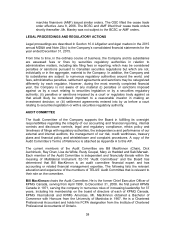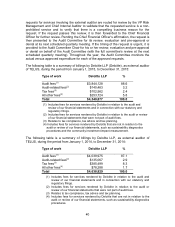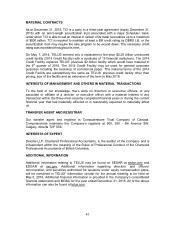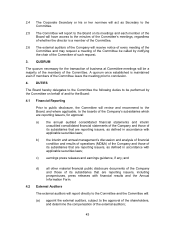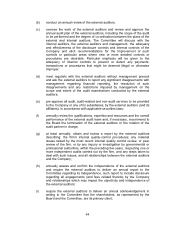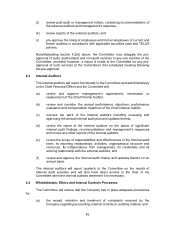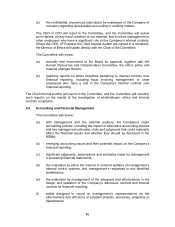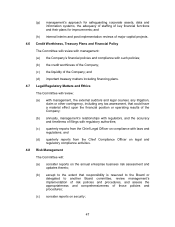Telus 2015 Annual Report Download - page 46
Download and view the complete annual report
Please find page 46 of the 2015 Telus annual report below. You can navigate through the pages in the report by either clicking on the pages listed below, or by using the keyword search tool below to find specific information within the annual report.46
(b) the confidential, anonymous submission by employees of the Company of
concerns regarding questionable accounting or auditing matters.
The CEO or CFO will report to the Committee, and the Committee will review
such reports, on any fraud, whether or not material, that involves management or
other employees who have a significant role in the Company’s internal controls.
Where the CEO, CFO and/or the Chief Internal Auditor are named in a complaint,
the Director of Ethics will speak directly with the Chair of the Committee.
The Committee will review:
(a) annually and recommend to the Board for approval, together with the
Human Resources and Compensation Committee, the ethics policy and
material changes thereto;
(b) quarterly reports on ethics breaches pertaining to internal controls over
financial reporting, including fraud involving management or other
employees who have a role in the Company’s internal controls over
financial reporting;
The Chief Internal Auditor will report to the Committee, and the Committee will consider
such reports, on the results of the investigation of whistleblower, ethics and internal
controls complaints.
4.5 Accounting and Financial Management
The Committee will review:
(a) with management and the external auditors, the Company’s major
accounting policies, including the impact of alternative accounting policies
and key management estimates, risks and judgments that could materially
affect the financial results and whether they should be disclosed in the
MD&A;
(b) emerging accounting issues and their potential impact on the Company’s
financial reporting;
(c) significant judgments, assumptions and estimates made by management
in preparing financial statements;
(d) the evaluation by either the internal or external auditors of management’s
internal control systems, and management’s responses to any identified
weaknesses;
(e) the evaluation by management of the adequacy and effectiveness in the
design and operation of the Company’s disclosure controls and internal
controls for financial reporting;
(f) audits designed to report on management’s representations on the
effectiveness and efficiency of selected projects, processes, programs or
departments;




